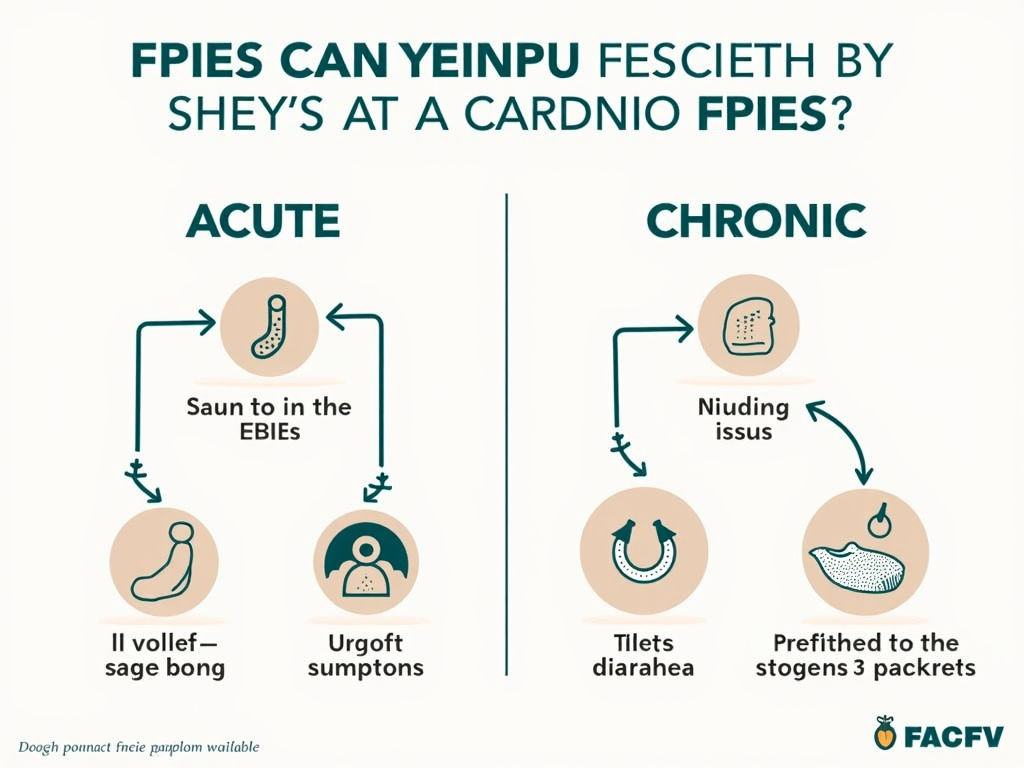Overview
Chronic FPIES (Food Protein-Induced Enterocolitis Syndrome) is a rare but serious type of food allergy that primarily affects infants and young children. Unlike typical food allergies, which often trigger immediate reactions like hives or swelling, FPIES causes delayed gastrointestinal symptoms. Chronic FPIES refers to a persistent form of this condition, where symptoms can be ongoing if the triggering food is consumed regularly. Understanding chronic FPIES and its relationship to food allergies is crucial for parents, caregivers, and healthcare providers to ensure proper diagnosis and management.

What is Chronic FPIES?
FPIES is a non-IgE mediated food allergy, meaning it does not involve the immune system's typical allergic response. Instead, it triggers a reaction in the gastrointestinal tract, leading to symptoms like vomiting, diarrhea, and dehydration. Chronic FPIES occurs when a child is repeatedly exposed to the offending food, often through formula or breast milk, leading to ongoing symptoms such as poor growth, lethargy, and persistent vomiting.
Key Differences from Acute FPIES
- Acute FPIES: Typically occurs when a child ingests a trigger food after a period of avoidance, leading to severe but episodic symptoms.
- Chronic FPIES: Results from continuous exposure to the trigger food, causing persistent symptoms that can be mistaken for other gastrointestinal disorders.

Symptoms of Chronic FPIES
The symptoms of chronic FPIES can be subtle and may develop over time, making diagnosis challenging. Common symptoms include: - Chronic vomiting: Often projectile and occurring multiple times a day. - Diarrhea: Can be watery or contain mucus. - Poor weight gain or growth: Due to malabsorption and frequent vomiting. - Lethargy: Children may appear tired or less active than usual. - Pallor: A pale appearance due to anemia or dehydration.
These symptoms can mimic other conditions like gastroesophageal reflux disease (GERD) or celiac disease, which is why accurate diagnosis is essential.

Diagnosis of Chronic FPIES
Diagnosing chronic FPIES requires a thorough medical history and often involves eliminating suspected trigger foods. Since there are no specific tests for FPIES, diagnosis is primarily based on clinical symptoms and response to dietary changes.
Steps in Diagnosis
- Medical History: Detailed discussion of the child's symptoms, feeding patterns, and family history of allergies.
- Elimination Diet: Removing suspected trigger foods from the child's diet to see if symptoms improve.
- Oral Food Challenge: Under medical supervision, reintroducing the suspected food to confirm the diagnosis.
It's important to work with a pediatric allergist or gastroenterologist experienced in FPIES to ensure accurate diagnosis and management.

Management and Treatment
Managing chronic FPIES involves strict avoidance of trigger foods and careful monitoring of the child's diet and growth. Common trigger foods include cow's milk, soy, rice, and oats, but any food can potentially cause FPIES.
Strategies for Management
- Dietary Avoidance: Completely eliminate trigger foods from the child's diet.
- Alternative Nutrition: Use hypoallergenic formulas or breast milk (with maternal dietary restrictions if necessary).
- Emergency Plan: Have a plan in place for accidental exposures, including when to seek medical help.
- Regular Monitoring: Track the child's growth and development to ensure they are thriving.
For more information on managing FPIES, visit the FPIES Foundation, a reputable organization dedicated to supporting families affected by FPIES.

Personal Insights and Stories
Living with chronic FPIES can be challenging for families. One mother, Sarah, shared her experience: "When my son was diagnosed with chronic FPIES, it was overwhelming. We had to completely change our diet and be vigilant about every ingredient. But with time, we learned to manage it, and seeing him grow healthy and strong makes it all worth it."
Another parent, John, emphasized the importance of support: "Connecting with other families through support groups was a game-changer. We shared tips, recipes, and encouragement, which made the journey less isolating."
These stories highlight the resilience and adaptability of families dealing with chronic FPIES.

Summary
Chronic FPIES is a complex condition that requires careful management and support. By understanding the symptoms, securing an accurate diagnosis, and implementing strict dietary controls, families can help their children thrive despite the challenges. Ongoing research and support from organizations like the International FPIES Association are crucial in advancing our knowledge and improving outcomes for affected children.
Discuss Here